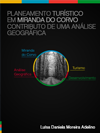
PLANEAMENTO TURÍSTICO EM MIRANDA DO CORVO CONTRIBUTO DE UMA ANÁLISE GEOGRÁFICA
Luísa Daniela Moreira Adelino
Abstract
Tourism, which is presented as a potential route to territorial development, is nonetheless a complex system that requires the proper functioning of a varied set of other, mutually compatible, systems if it is to work in a balanced manner.
Tourism in Portugal (and elsewhere in Europe) is tending to grow in terms of new geographical choices, with visitors opting for the countryside, bodies of water and mountainous regions.
New products, designed to attract specific segments of the tourist market, also offer the chance to regenerate and revitalise territories and improve the quality of life of their populations.
A new kind of tourist is thus emerging, one who is more active and participative, with a wider range of interests, better informed and more demanding.
Rural areas in mountain regions offer a base of varied resources that are highly important for the development of tourist activities and which give these areas prominence in the panorama of today’s tourist destinations. But these territories exhibit many weaknesses which are due to their particular specificities.
And while tourism can create new opportunities it can also engender problems. Tourist planning therefore acquires special relevance in the development of these territories.
The municipality of Miranda do Corvo is an interesting example for study, since it has been undertaking a number of tourism initiatives. First the territory is generally contextualised and then its strengths, weaknesses, opportunities and threats are characterised. Its resources and tourist products are then surveyed, and finally the strategies and plans for tourism in Miranda do Corvo are examined in a retrospective analysis and a description of schemes to be implemented in the near future.
| En eumed.net: |
 1647 - Investigaciones socioambientales, educativas y humanísticas para el medio rural Por: Miguel Ángel Sámano Rentería y Ramón Rivera Espinosa. (Coordinadores) Este libro es producto del trabajo desarrollado por un grupo interdisciplinario de investigadores integrantes del Instituto de Investigaciones Socioambientales, Educativas y Humanísticas para el Medio Rural (IISEHMER). Libro gratis |
15 al 28 de febrero |
|
| Desafíos de las empresas del siglo XXI | |
15 al 29 de marzo |
|
| La Educación en el siglo XXI | |




